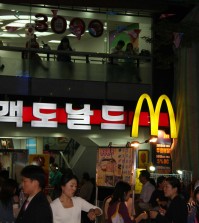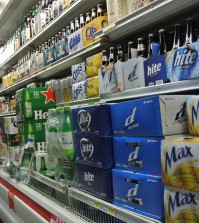- California Assembly OKs highest minimum wage in nation
- S. Korea unveils first graphic cigarette warnings
- US joins with South Korea, Japan in bid to deter North Korea
- LPGA golfer Chun In-gee finally back in action
- S. Korea won’t be top seed in final World Cup qualification round
- US men’s soccer misses 2nd straight Olympics
- US back on track in qualifying with 4-0 win over Guatemala
- High-intensity workout injuries spawn cottage industry
- CDC expands range of Zika mosquitoes into parts of Northeast
- Who knew? ‘The Walking Dead’ is helping families connect
Trouble brewing: OB’s market share drops below 50%
Oriental Brewery (OB) is quickly losing its market dominance after a “disinfectant odor” scandal that began in June.
The company’s gap in market share with rival Hite Jinro has narrowed quickly at major retailers and restaurants. The scandal has also left a huge dent in its brand image, with the company launching various campaigns aimed at regaining public confidence.
The bad odor was found to have stemmed from an organic compound formed during the brewing process, not from a harmful chemical substance. Nevertheless, many people still tend to shun OB’s best-selling beer, Cass.
“Following the scandal, I don’t drink Cass,” a salaried woman in her mid-20s said. “I was told that the odor doesn’t pose a health risk, but I still don’t want to drink the beer.”
OB claims its market share has fallen about 2 percent since the scandal, but did not provide concrete figures.
Lotte Mart, one of the biggest stores, estimates OB sales have fallen about 4 percent. In April, OB’s market share at Lotte outlets reached 61.4 percent, but it fell to 54.1 percent in July and 46.9 percent in September.
Hite Jinro took advantage of OB’s problems ㅡ the No. 2 beer maker’s market share climbed to 38.3 percent last month, up 5.3 percent from July and a whopping 30.4 percent since April.
An OB spokeswoman said the company’s sales at major retailers such as Lotte accounted for only 10 percent of sales, underscoring that the Lotte figures did not represent OB’s market status.
Another trouble facing OB is its tarnished brand image. Local brand value evaluator Brand Stock said OB ranked 28th out of 100 top Korean brands in the third quarter, down 14 notches from the second quarter. Hite Jinro ranked 36th.
Market insiders say OB initially responded badly to the odor scandal, which fueled rumors against Cass through portals and mobile messaging services.
Rumors had it that an unidentified person saw disinfectants being mixed with beer during manufacturing, adding women of childbearing age should not drink Cass beer produced between June and August.
“The biggest problem was that OB’s initial response, which focused on denying responsibility (for the trouble), rather than actively engaging in the issue to contain the rumors spreading as quickly as possible,” a public relations expert said. “Having a good brand image is very important, especially in the food and drink industry, because brand and sales are deeply co-related.”
The OB spokeswoman said the company was “doing everything it could to restore confidence in OB products.” To that end, the company, whose biggest shareholder is New York-based brewer ABInbev, decided to spend 120 billion won on improving its quality control.
“It’s not easy work to restore confidence, but we need to do it,” she said. “We’ve adopted a variety of measures to provide customers with fresh, clean beer.”
Liquor industry insiders say imported beers are emerging as another threat to OB’s bottom line. Imports of foreign beer, mostly from Europe, in the January-August period were estimated at $72.9 million, up 21.8 percent year-on-year, according to the Korea Customers Service (KCS).
The market has shown annual double-digit growth since 2010 on the back of the Korea-EU free trade agreement, KCS said.

















